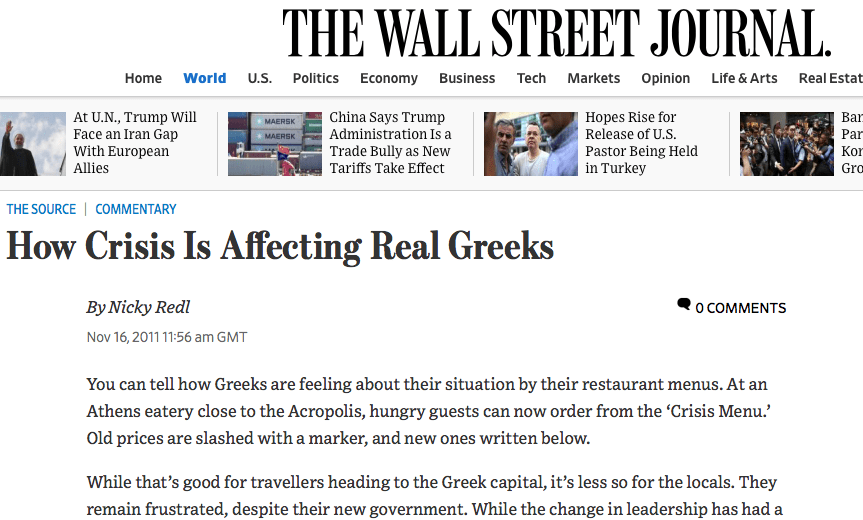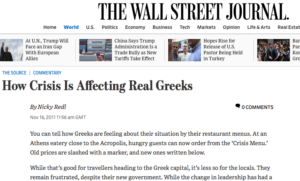You can tell how Greeks are feeling about their situation by their restaurant menus. At an Athens eatery close to the Acropolis, hungry guests can now order from the ‘Crisis Menu.’ Old prices are slashed with a marker, and new ones written below.
While that’s good for travellers heading to the Greek capital, it’s less so for the locals. They remain frustrated, despite their new government. While the change in leadership has had a calming effect on financial markets, and according to Greek opinion polls Prime Minister Lucas Papademos’ approval rating is above 70%.
But this has not alleviated the pessimism Greeks harbor towards their politicians. Many see lawmakers as the ones who got them into the crisis, leaving tax payers to deal with the consequences. Signs of anger are evident especially near the Parliament building. Marble plates are smashed, some walls defaced with graffiti.
Even sport has become political. At the starting line of Sunday’s Athens marathon, instead of cheering, runners booed in response to pre-run comments about the government over loudspeakers.
Panayota Tselenti, a 22-year-old hostel receptionist and student, says the crisis is affecting local businesses the most. Her mother spent 20 years running a women’s clothing store, but has now been forced to close it.
She said:
“Things are really painful right now, because everything that’s a little more expensive than the average is unaffordable.”
Her mother took out loans when sales went down, but now can’t pay her debt as business hasn’t improved. “I think people are more interested in buying food than buying clothing,“ Mrs. Tselenti says. Without a job, there is no chance of paying back the banks.
It’s a situation faced by increasingly more Greeks. Data released by the Hellenic Statistical Authority last week shows the country’s unemployment rate for August was at 18%, a huge increase compared to 12.2% in August 2010.
Ms. Tselenti says even though she does have work, it’s hard to get by on her wages. In her second job as a waitress she’s noticed people aren’t even leaving tips anymore.
“I have two jobs and can’t support myself. My parents can’t support me anymore and I’m in a difficult position. This makes me want to leave the country.”
At her university, teachers can’t hand out notes because there is no paper to print them. Ms. Tselenti says within her circle of friends and family, people believe any government measures to curb the debt crisis will only hurt those who are already struggling, while wealthy people won’t have to tighten their belts.
She added:
“I think I would be satisfied if I went to the doctor and didn’t have to pay or if I went to my university and we had paper to print.”
But these aren’t problems she expects the new government will solve.
So while Greeks still see reasons to protest, tour guide and business co-owner Vangelis Koutris says recent riots and strikes haven’t improved the situation. It’s keeping money out of the country by hurting the tourism industry.
“We’ve had quite a lot of cancellations in November”, he says. “It’s a bad thing to create the idea that Athens might at any point have violence, demonstrations, strikes. All of these things don’t advertise the place.”
Travellers were stuck at airports, or couldn’t board tour boats, due to strikes, and Mr. Koutris says the economy can’t afford it. But he believes that by now an increasing number of Greeks realize that some form of change will have to take place to address the crisis and stay in the euro zone.
“We’ve had too many protests, too many strikes, even before the crisis,” Mr. Koutris said. “It’s like it’s become a mentality.”
Published by The Wall Street Journal online on November 16, 2011.

